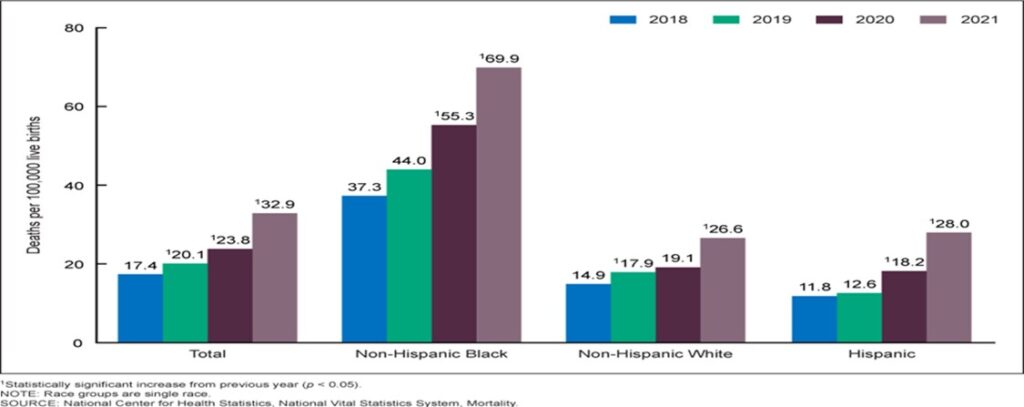By Khadeja Haye, MD, MBA, FACOG
National Medical Director, Acute Hospitalist Medicine, OB/GYN Hospitalist
The recent and untimely passing of the Olympian athlete and track star Tori Bowie has once again raised awareness of the healthcare crisis related to maternal mortality in the United States. It also sheds light on the maternal health disparities that exist and disproportionately affect Black mothers.
Maternal Mortality Rates Are Steadily Rising
Maternal death is defined by the World Health Organization as “the death of a woman while pregnant or within 42 days of termination of pregnancy, irrespective of the duration and the site of the pregnancy, from any cause related to or aggravated by the pregnancy or its management, but not from accidental or incidental causes. The maternal mortality rates in the United States (U.S.) have been steadily on the rise. In 2019 the maternal mortality rate was 20.1 per 100,000 live births, in 2022 it rose to 2021 32.9 deaths per 100,000 live births which is a 64% increase compared to 2019. The U.S. has the highest maternal mortality rates among developed countries.
Health Disparities Continue to Put Black Mothers More at Risk
When we further evaluate the maternal mortality trends, we have to make note of the impact on black mothers. Health disparities contribute to increasing maternal mortality rates among particular minority populations. Black women are dying at a much higher rate that is 2-3 times higher than both their White or Hispanic counterparts.

As healthcare providers, we should be alarmed. First, seeking to understand why maternal mortality rates are increasing, then focus our efforts on finding solutions to this healthcare crisis. While it may be uncomfortable to acknowledge, we have to also address the role bias plays in creating the health disparities that have become apparent. Having an awareness of the maternal mortality issue in the U.S is the first step. As healthcare providers, we have to work together to find solutions and collaborate in their implementation.
Addressing the Causes of Healthcare Disparities
Creating protocols and standardizing the care we provide will improve the recognition of those conditions that contribute to severe maternal morbidity. Standardizing our care will also mitigate the impact of our personal biases.
Health professionals are only one piece of this complex puzzle. Addressing the various social determinants of health which include our current health care system, community resources, access to quality education, access to adequate food/shelter and the current economic climate are all related and require consideration. While this may seem like a daunting task, we all need to determine how each of us can contribute to those solutions. There are numerous organizations doing great work, but more needs to be done.
I may not have all of the answers, but I am committed to doing my part in addressing maternal mortality and closing the racial gap in outcomes related to health disparities. It is not an option for me, it is a central part of my clinical and personal mission. It is a matter of life and death for too many women in this country, many of whom look like me.
Follow our social media channels and subscribe to our blog for more regarding maternal health disparities and how TeamHealth is working toward solutions.